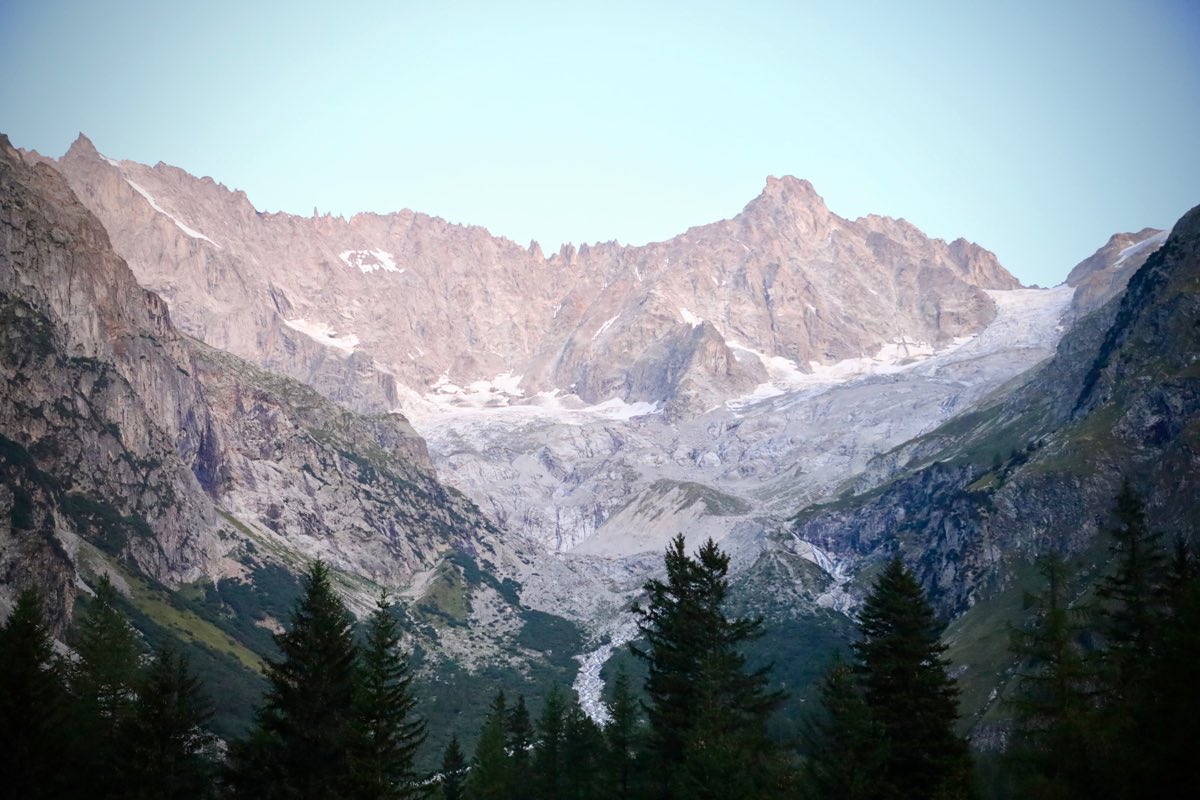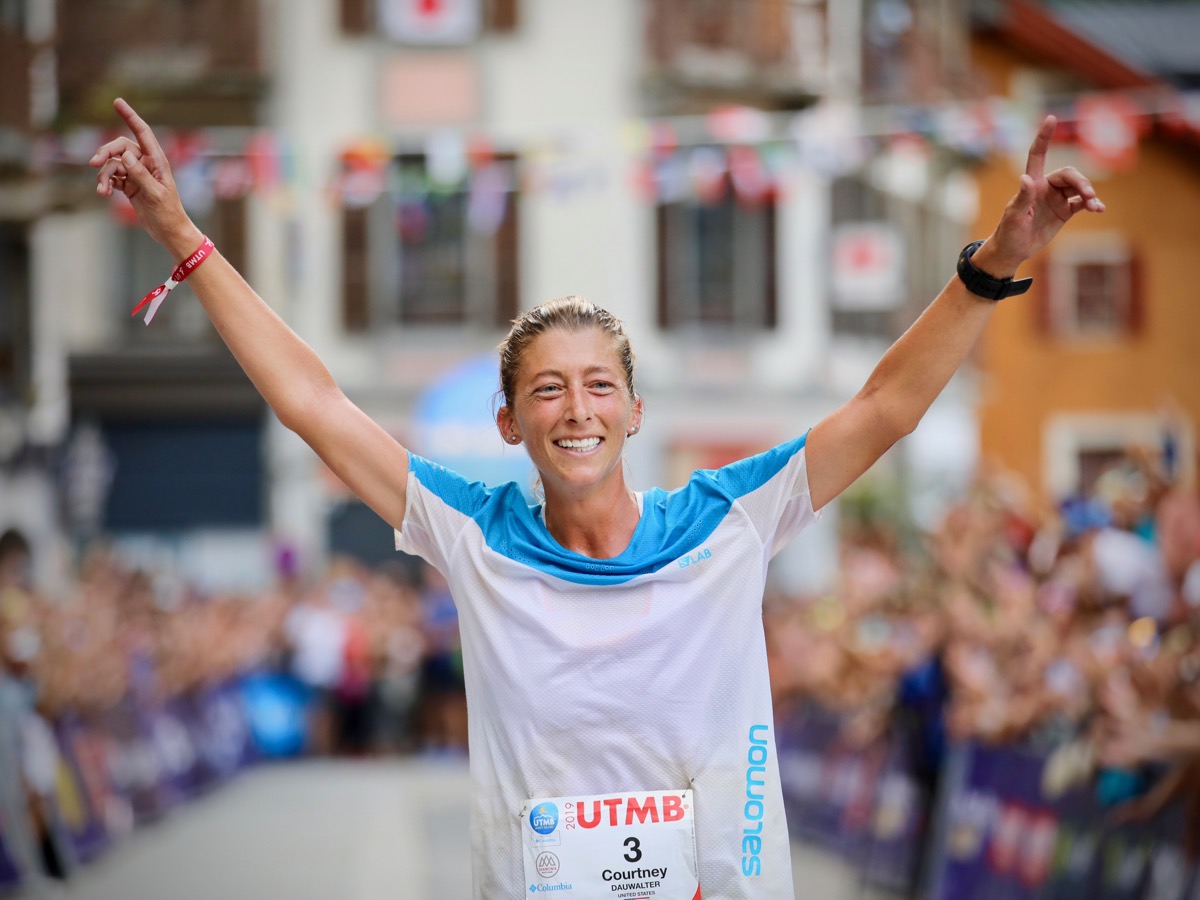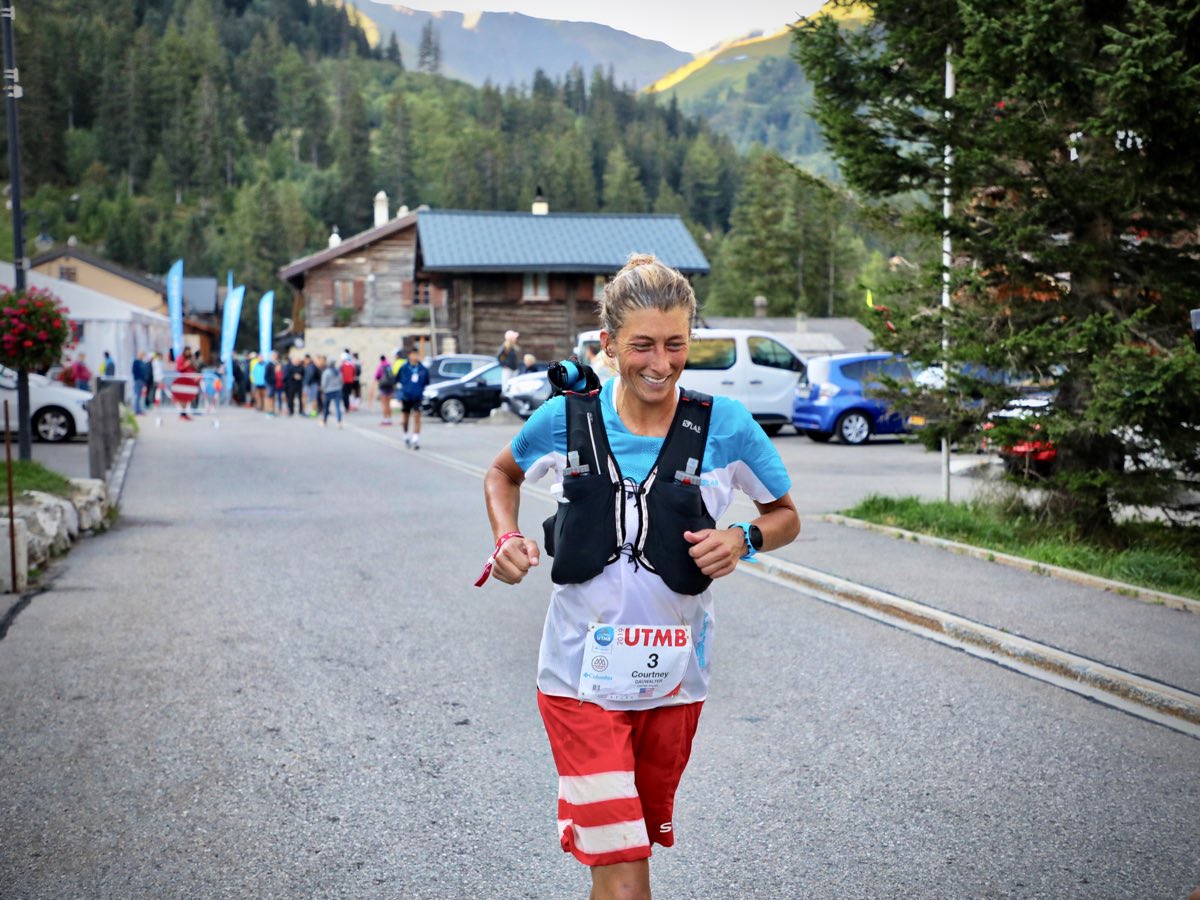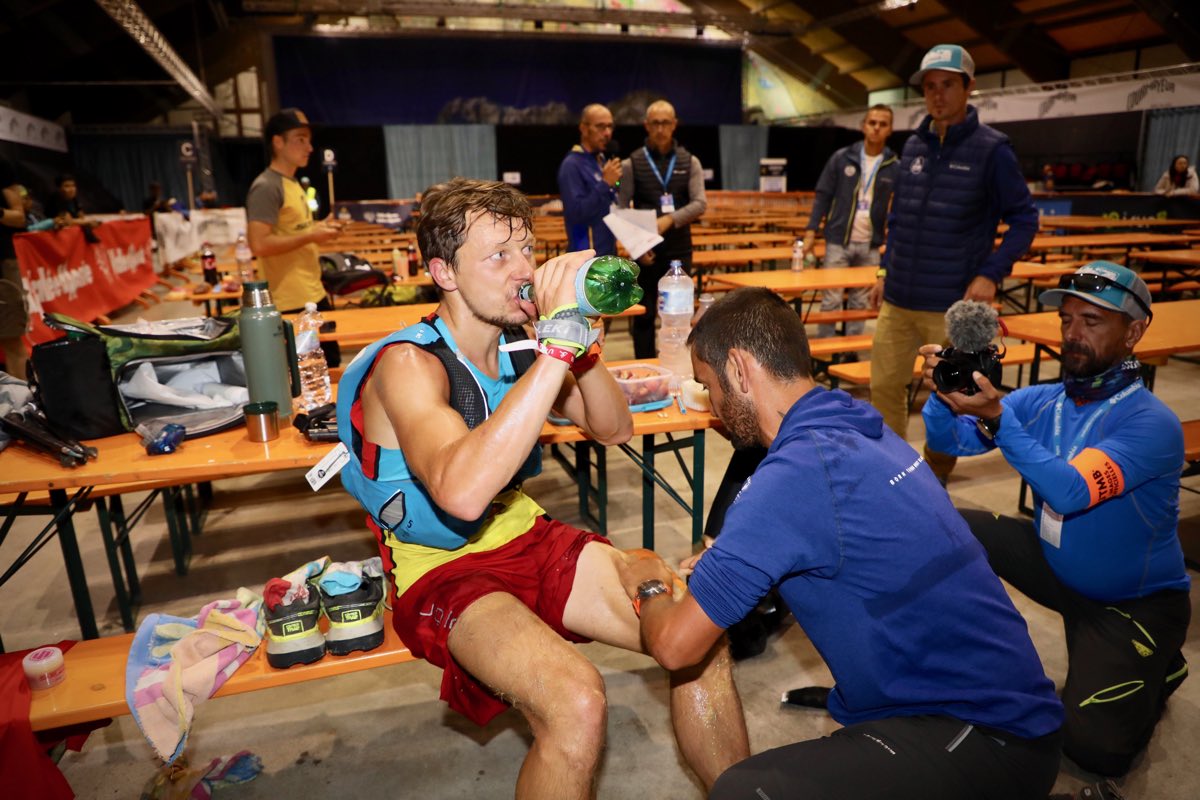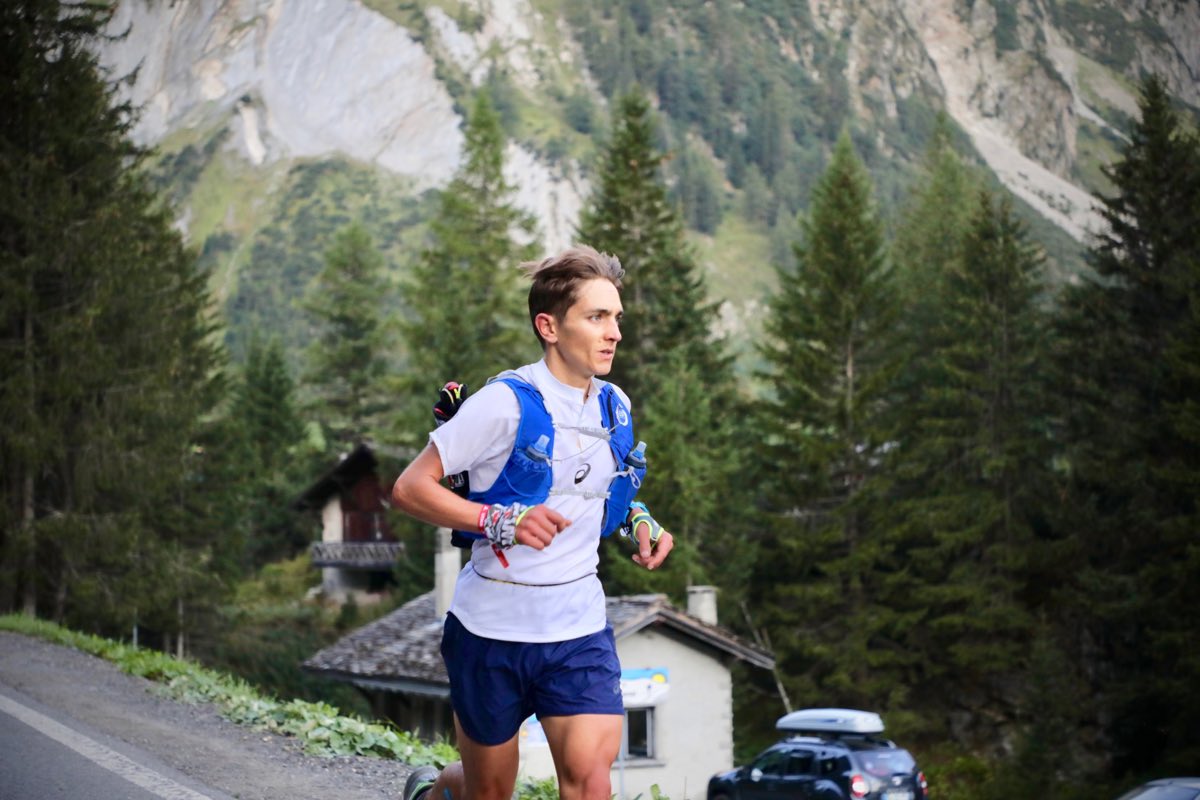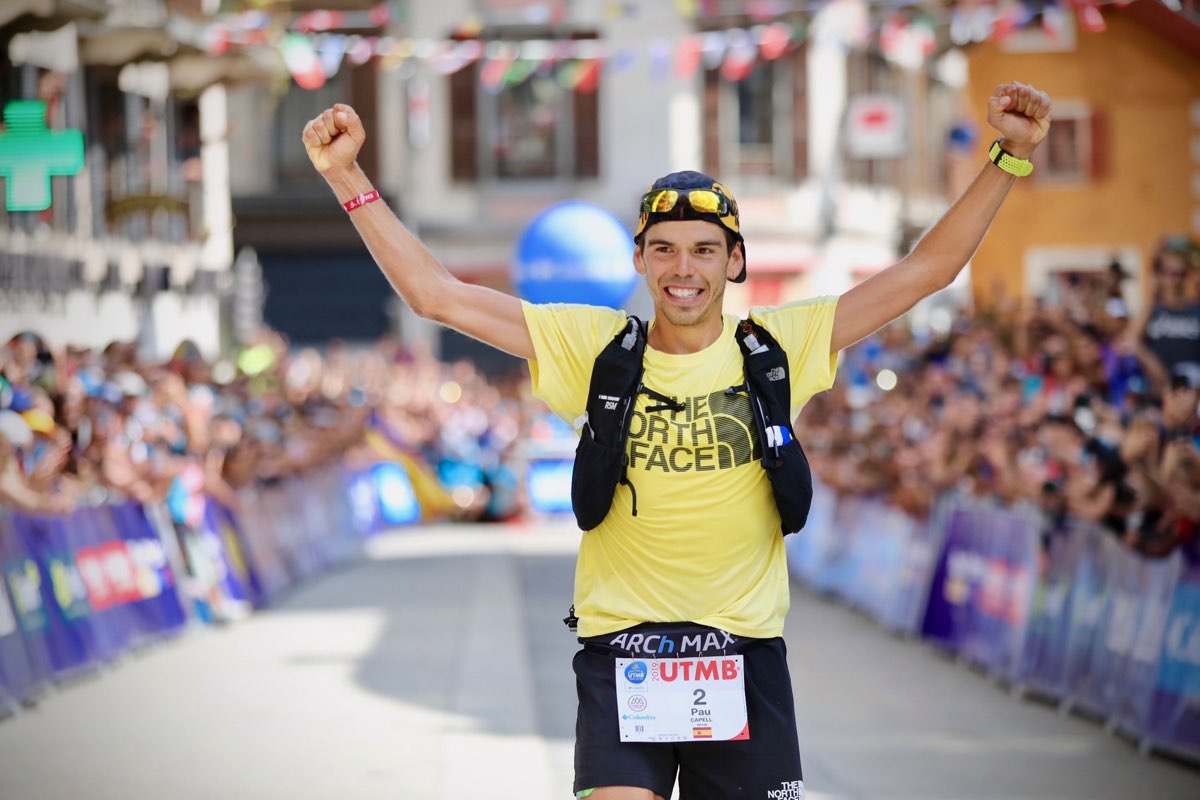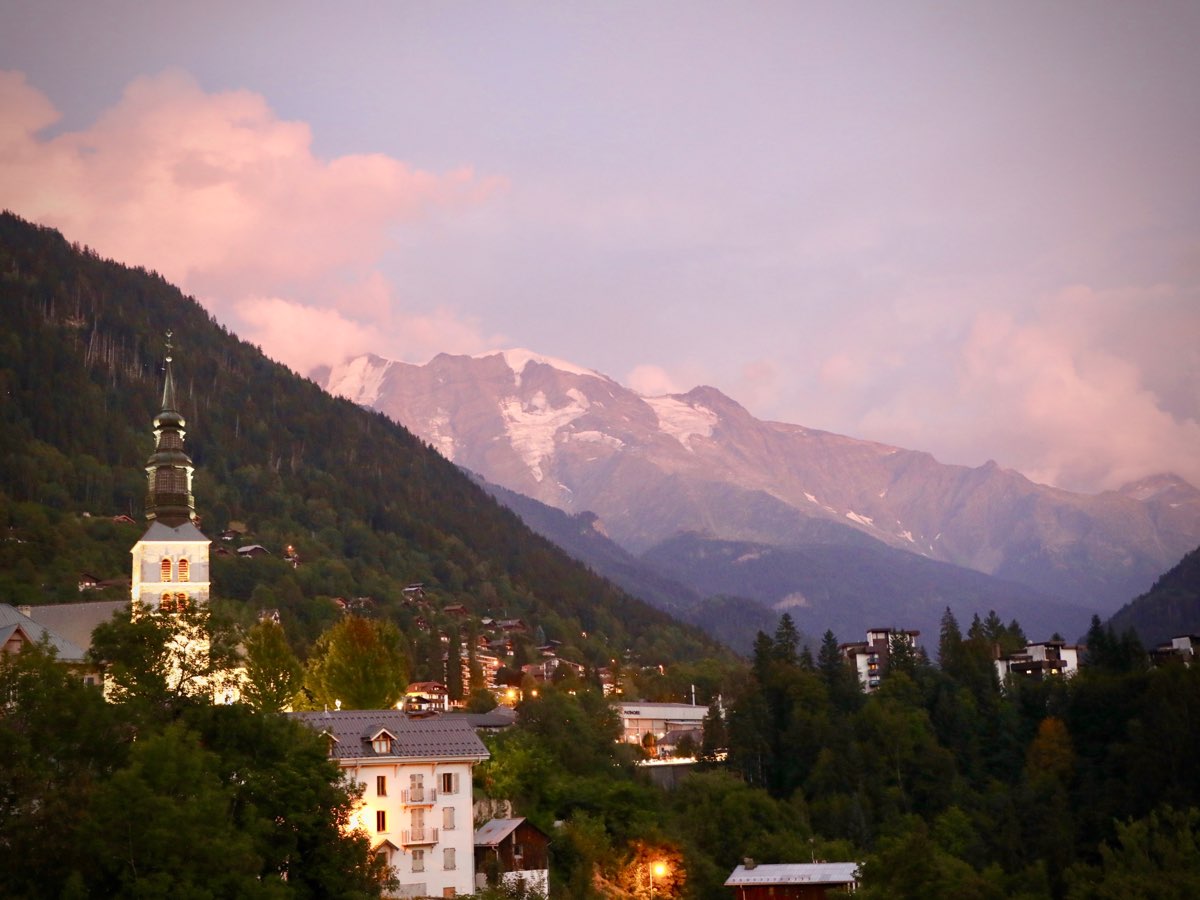 The USA’s Courtney Dauwalter and Spain’s Pau Capell won the 2019 UTMB, in doing so making the 170-kilometer/105-mile loop around the European Alps’s Mont-Blanc massif starting and finishing in Chamonix, France.
The USA’s Courtney Dauwalter and Spain’s Pau Capell won the 2019 UTMB, in doing so making the 170-kilometer/105-mile loop around the European Alps’s Mont-Blanc massif starting and finishing in Chamonix, France.
The 2019 edition fired off on Friday, August 30 under stormy skies, as lightning flashed, thunder rumbled, and rain splattered up and down the Chamonix Valley. The race’s notoriously wet weather abated, though, and Mother Nature greeted most of the field–composed of 2,543 starters–with a warm evening, a comfortable first night, and a hot-and-humid Saturday. Saturday-afternoon thunderstorms returned around the course, bringing some runners a break from the heat. As far as we can tell, no modifications were made to the course due to weather for the front of the pack, as frequently happens at UTMB.
Pau Capell’s dominant performance in the men’s race was followed up by the defending champion, France’s Xavier Thévenard, taking second and New Zealand’s Scott Hawker bringing home bronze in what can only be described as a breakout performance. In the women’s race, Courtney Dauwalter was untouchable for the win, while Kristin Berglund broke out equally big with her second place and Spain’s shorter-distance trail star Maite Maiora took third, proving she can run as well at longer trail ultramarathons as she does at shorter events.
In the balance of this article, we report in-depth on how the men’s and women’s races played out. Don’t forget to have a look at our photo gallery from this year’s race.
A special thanks to Camelbak for making our coverage of UTMB possible!


Thanks also to Altra and Jaybird for their support of our UTMB coverage.
To get all the latest ultra news from iRunFar.com, subscribe via RSS or email.
2019 UTMB Women’s Race
The women’s race for the win was up in the air for some 90-plus kilometers. Off the start line, China’s Miao Yao, who has enormous talent and a growing trail resume which included winning last year’s CCC but was racing 100 miles for the first time, went out like a bullet. If any of the women in the field had contact with her in the race’s first half, it had to have been in the first couple hundred meters because at seven kilometers in she was already more than 1.5 minutes off the front and then at 20km in she was up to 9.5 minutes ahead of the field. Game on, Yao.
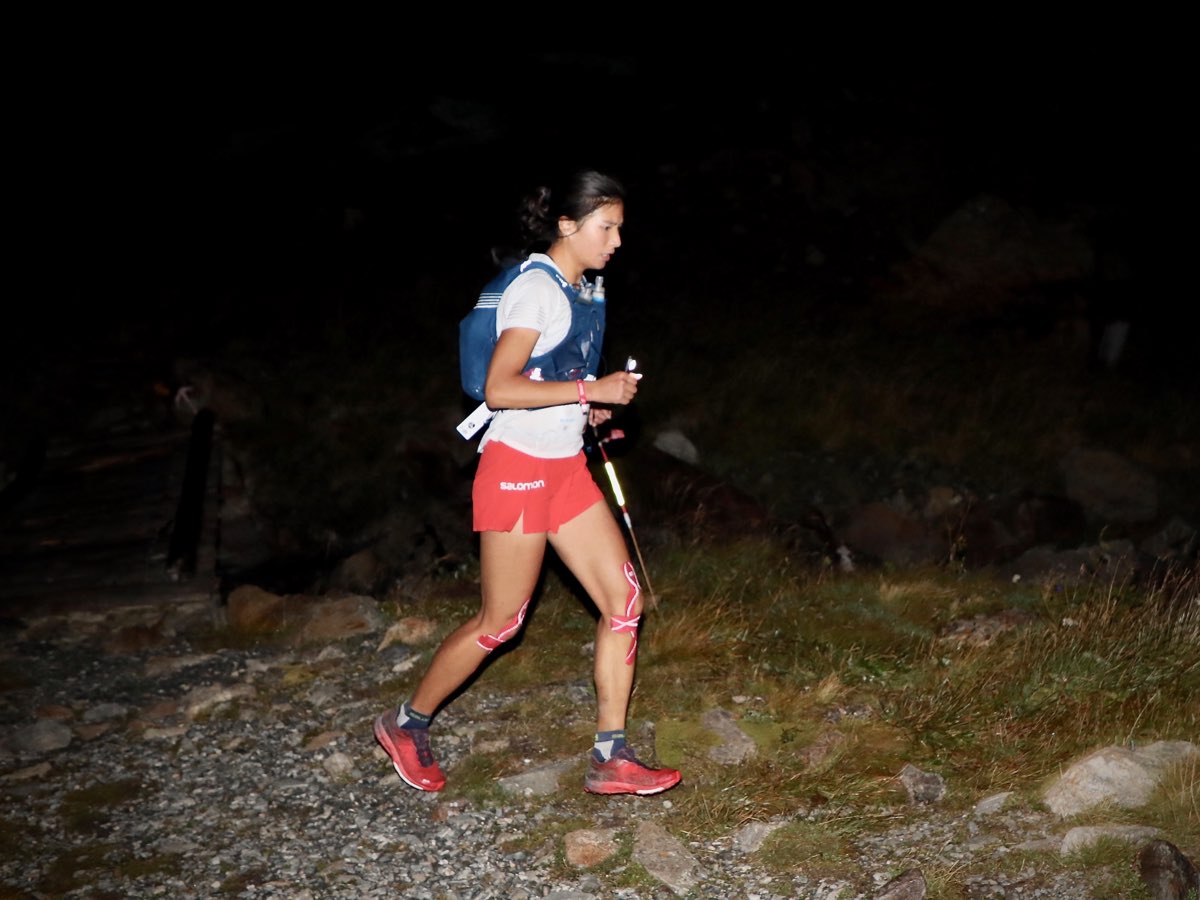
China’s Miao Yao running in the lead about 66 kilometers into the 2019 UTMB. Photo: iRunFar/Meghan Hicks
In the race’s early hours, a long train of talented women strung out behind Yao, as we mentioned quite a distance from her but not so far apart from each other. That is, at 20km in, second and tenth places where just four minutes apart. Then at 43km, the gap was just 20 minutes between #2 and #10. But the UTMB’s marathon mark is one of several points in which this race gets interesting. That’s because runners are out in the deep night and the race’s most remote terrain, mostly off the grid in the mountains of Italy. A lot can and does happen out there! When we saw the women at about 66km, where they come out of that burly terrain and begin their approach to the relative mountain metropolis of Courmayeur, Italy, the women’s top 10 had strung out quite a lot and there had been some change-ups in who was in the frontrunner game. Yao remained steadily out front, with a 15-minute lead. Courtney Dauwalter (pre-race and post-race interviews) had moved herself firmly into second position, and by firm I mean there was not only a gap between she and Yao in first but also between she and Mimmi Kotka who would run in third place for quite some time. A few other familiar faces were in place near the front, such as the U.K.’s Beth Pascall (pre-race interview) who’d finished fourth last year and who wasn’t shy in saying during her pre-race interview with us that she wanted to improve upon that effort.
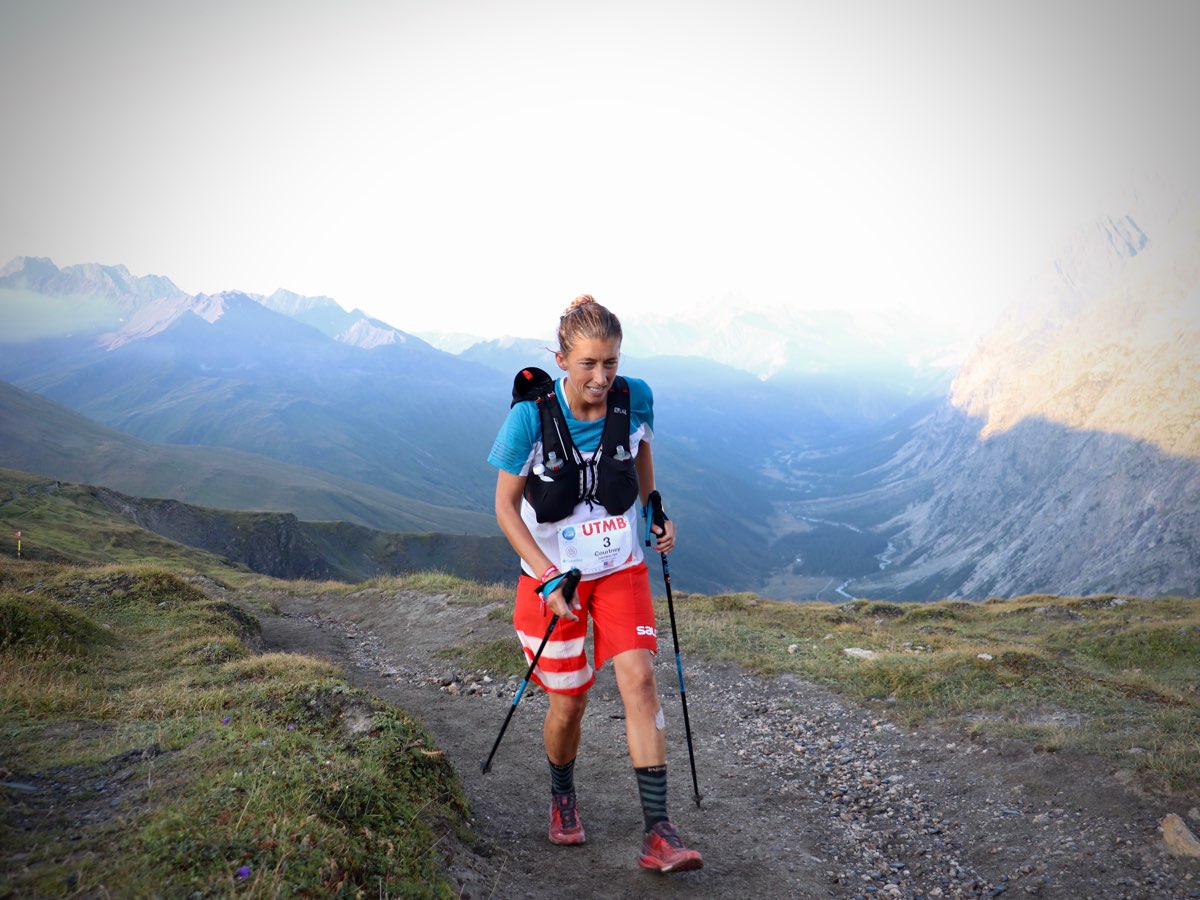
Courtney Dauwalter cresting the Grand Col Ferret during the 2019 UTMB. Photo: Trail Running Argentina/iRunFar/Mauri Pagliacci
It is said that UTMB ‘starts’ in Courmayeur, Italy, when the race reaches the 80km point. That is, to do well, you gotta’ turn up feeling strong at Courmayeur. Indeed, the race’s lead-three women all looked well there, with perhaps the smallest possible crack beginning in leader Yao’s armor as the time gap between she and Dauwalter had decreased by 2.5 minutes. Everything can shift on a dime in ultrarunning, and that’s exactly what happened next. In the 12km between Courmayeur and Refuge Bonatti, located high in on a ridgeline, Dauwalter assumed the lead, coming into the refuge with a 10-minute gap to Yao in second. Yao’s day spiraled hard downhill from there, as she would be a DNF due to physical problems less than 20km later in La Fouly.
Suddenly, it was a whole new women’s race and its dominant force was Dauwalter. To be honest, the last quarter or so of this race looked hard for her. There was some real grin-and-bear-it action at times, she sending positivity out into the world but also no longer able to fully mask the effort’s difficulty. No matter what she looked like or said, however, the numbers never lied. Aid station by aid station she increased her lead such that by 153km in Vallorcine, after passing from Switzerland back to France, she’d accumulated an hour’s lead. This was a gap she’d maintain on the women’s field all the way back to the finish in Chamonix. Even though she had a hip injury that required time off from running this summer, she was a cut above the rest of the women’s field. It was with great admiration from an international crowd lining the streets of Chamonix that she was welcomed over the finish line as the 2019 UTMB champion.
I’ve said it before and I’ll say it again: I love these globally competitive races where runners who have been regionally or nationally successful in their home communities break out onto the international stage. Almost every one of these races has at least one, and this year’s women’s breakout is Kristin Berglund (post-race interview) who took second place. Nearly all race, the Swede living in Austria featured in the women’s top 10, for a long time in the back half of it before picking her way through the pack in the race’s second half. There were inklings of how good she might do here based on her previous performances, including in taking fifth at this year’s Transvulcania Ultramarathon. But UTMB is 100 miles, and a tough 100 miles at that. Berglund made her second-place effort look like clockwork, though. She was reliable, strong, and fluid all night, all day, and all the way around Mont Blanc.
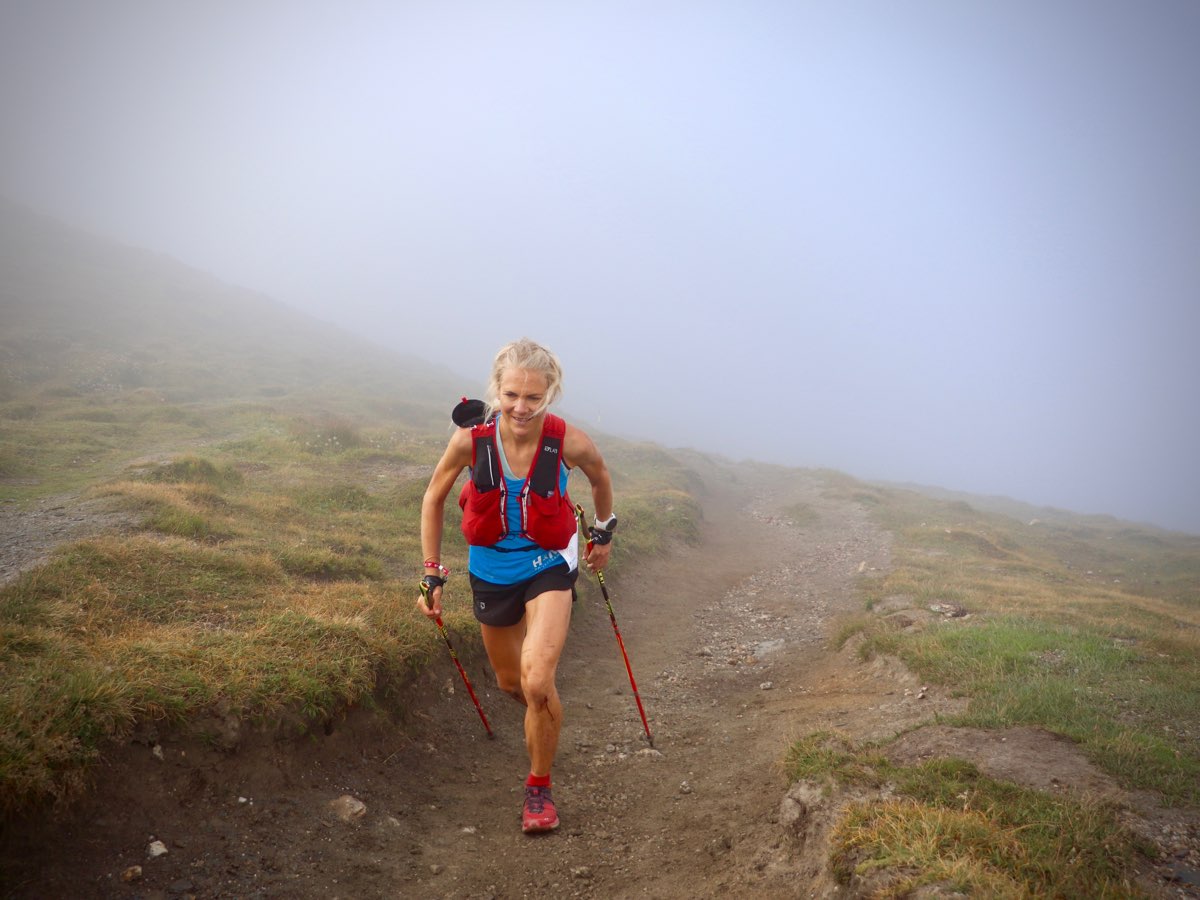
Kristin Berglund on her way to taking second at the 2019 UTMB. Photo: Trail Running Argentina/iRunFar/Mauri Pagliacci
As the race’s kilometers waned, there was still plenty of racing to be done in the women’s field. One woman who had an incredible final-quarter surge was Spain’s Maite Maiora (post-race interview). With plenty of success in shorter-distance trail running to lean on but nothing beyond about the 100km distance, Maiora went out really easy, so easy she wasn’t even in the top 20 at 20km into the race. Fast forward something like 20 hours, most of the way around Mont Blanc, and in Vallorcine with less than 20km left to run, Maiora had surged into podium position and looked amazing. Though the women behind her weren’t too far off, Maiora held tight to that third place until the finish.
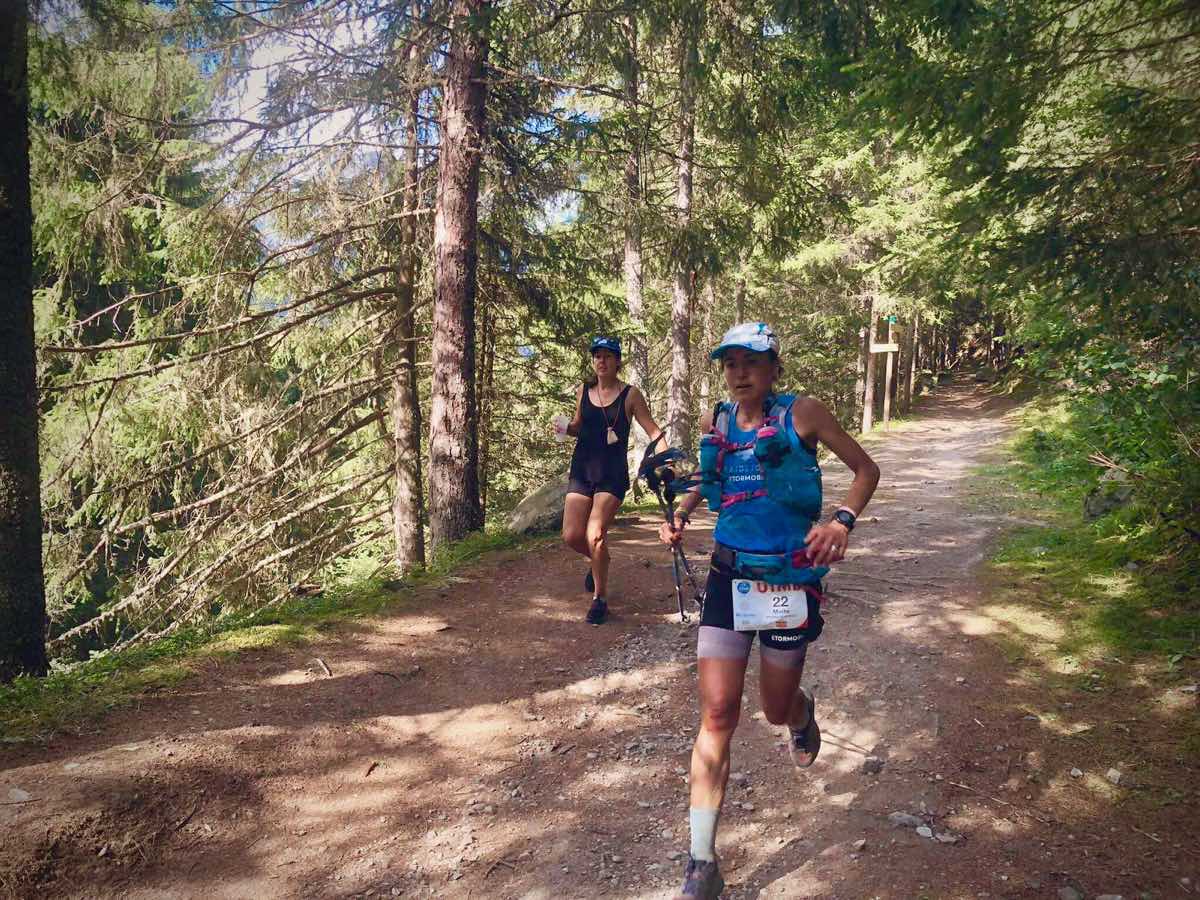
Maite Maiora running her way into third place at her first 100 miler, the 2019 UTMB. Photo: iRunFar/Marissa Harris
The remaining top-10 women fit into two clear categories: those who started very easy and moved up late, and those who put themselves into top-10 position right away and held it. In the former category, we have Russia’s Ekaterina Mityaeva. Like several other top women’s finishers, Mityaeva was venturing into the 100-mile distance for the first time and so she was clearly employing the conservative-early strategy. At several of the later aid stations, she looked pretty tired to our field team. But if she was feeling the effort, she was still moving well relative to her competitors. Her relief was palpable at the finish line when she crossed in fourth place.
Pascall, Katie Schide (post-race interview) who is an American living in Switzerland, and Elise Delannoy from France fit in the category of featuring up front all day and finishing in the top 10. Pascall ultimately took fifth, a position lower than last year but what I’d call a definite performance improvement. Her 2018 and 2019 times are nearly identical, though the 2019 course was longer and had more climbing. Schide and Delannoy respectively took sixth and seventh.
Now, let’s talk about the top-10 finishers who used the move-up-fast-and-hard-late strategy. American Rory Bosio (pre-race interview), two-time UTMB champion, didn’t feature in the women’s top 20 for at least 20km and the top 10 until the race’s final third. In addition to her all-day consistency, which led to an eighth-place finish, she provided entertainment out on the course for so many, hamming it up for her many fans, before sprinting to the finish to break 28 hours. Hungary’s Ildikó Wermescher finished in ninth in what had to be the day’s best example of pacing. She was 651st overall at 8km into the race–well out of the women’s top 20–and 129th overall as well as ninth woman at the finish. Tenth place was France’s Delphine Avenier who squeaked into the top 10 in the race’s final kilometers.
After featuring in the women’s podium race early, Kotka eventually finished in 20th. Several favorites didn’t make it to the finish, including defending champion Francesca Canepa (pre-race interview), last year’s second place Uxue Fraile (pre-race interview) of Spain, the USA’s Kaci Lickteig, and the Brazilian living in Spain Fernanda Maciel.
2019 UTMB Women’s Results
- 1. Courtney Dauwalter (Salomon) – 24:34:26 (pre-race and post-race interviews)
- 2. Kristin Berglund (Salomon) – 25:34:12 (post-race interview)
- 3. Maite Maiora (RaidLight) – 25:41:30 (post-race interview)
- 4. Ekaterina Mityaeva (adidas) – 25:53:26
- 5. Beth Pascall (Salomon) – 26:26:48 (pre-race interview)
- 6. Katie Schide (On Running) – 27:22:56 (post-race interview)
- 7. Élise Delannoy (Salomon) – 27:48:32
- 8. Rory Bosio (The North Face) – 27:59:45 (pre-race interview)
- 9. Ildikó Wermescher (Hoka One One) – 28:13:32
- 10. Delphine Avenier (Hoka One One) – 28:35:23
- 11. Fu-Zhao Xiang (Toread) – 28:57:26
- 12. Elisabet Margeirsdottir (66* North) – 29:37:23
- T-13. Giulia Vinco – 30:03:37
- T-13. Maija Oravamäki (Salomon) – 30:03:37
- 15. Naomi Brand – 30:19:48
- 16. Yulia Baykova (Vibram) – 30:33:58
- 17. Juliette Blanchet (Vibram) – 31:06:26
- 18. Sabrina Cachard – 31:23:30
- 19. Kellie Emmerson (Hoka One One) – 31:31:01
- 20. Mimmi Kotka (Salomon) – 31:46:21
2019 UTMB Men’s Race
Alright, let’s dive deep into how the men’s race played out. The men’s race featured an outstanding line-to-line performance for the win, many blow-ups, and all the entertainment of running 100 miles around the Mont Blanc massif. As you may have read in our men’s preview, Chamonix once again gathered some of the best male trail ultrarunners in the sport. On paper, as a three-time champ as well as the defending champ and the guy with the most victories at the UTMB festival of races, France’s Xavier Thévenard (pre-race and post-race interviews) was the clear man to beat. But the rest of the line-up made us look forward to a good spectacle, especially the quiet confidence we felt out of Spain’s Pau Capell (pre-race and post-race interviews) when we spoke with him pre-race. After the fanfare and freneticism of the UTMB start, the countdown to the race finally ended and the men dashed off. In the lead off the line was Capell and Chinese star Min Qi.
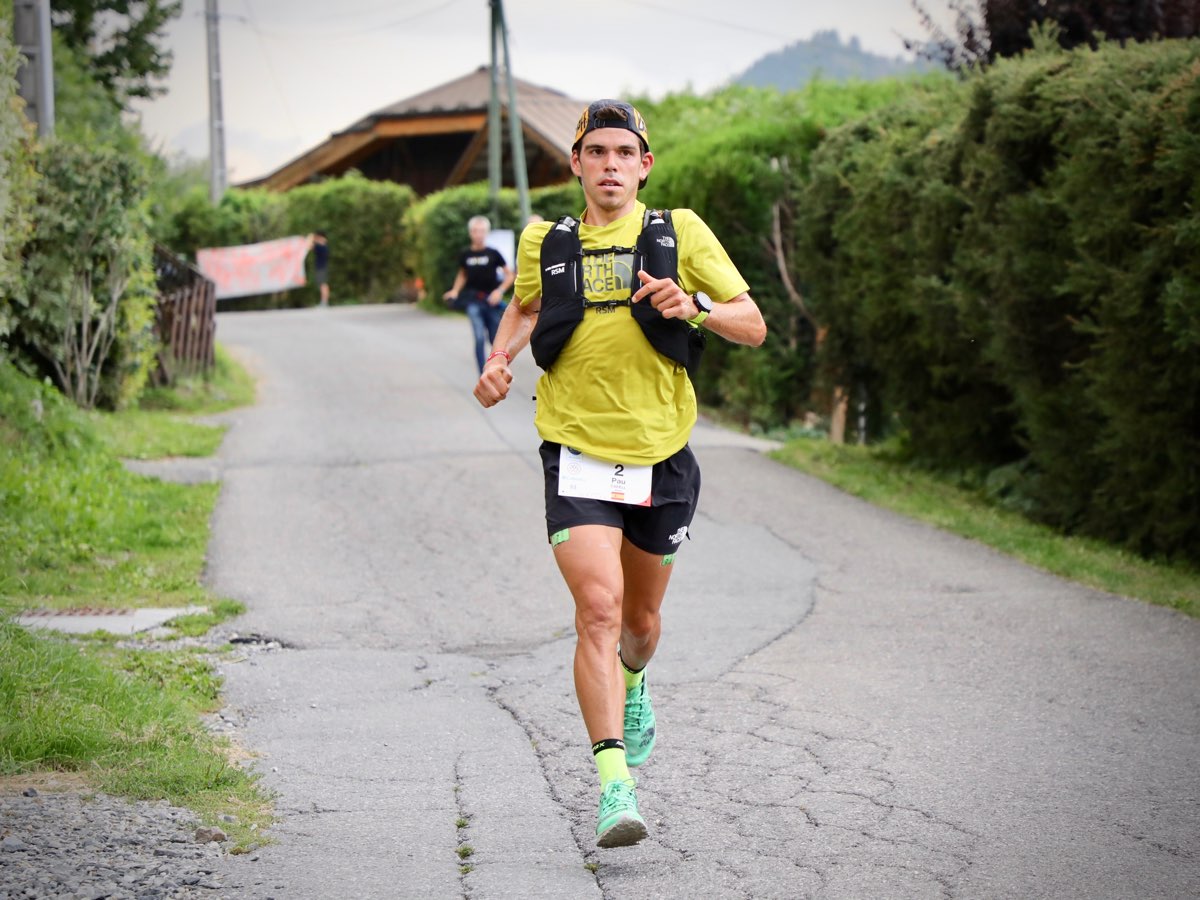
Pau Capell already alone and way out front at St. Gervais, 20 kilometers into the 2019 UTMB. Photo: iRunFar/Meghan Hicks
In a race filled with complex and intertwining variables, the men’s race for the win was perhaps as simple as it’s been at UTMB in a half decade or more. Capell immediately surged to the front and never looked back. We’ve seen this kind of running before, at this race and this early place in the event and, honestly, the odds are stacked heavily against the pace setter. What was funny–or at least coincidental–about all this is that Capell even said in his pre-race interview with iRunFar that he planned to take it slow while he thought others would go out too hard. At just 31km in, the Catalan had a full eight minutes on Thévenard in second, for example. But when we spoke with him post-race, he said that he ran according to the splits he’d made, and was surprised that his intentional pacing put him ahead of everyone.
Chasers at this point, 31km, included the likes of Zach Miller (pre-race interview), Tim Tollefson (pre-race interview), Erik Sorenson, Hayden Hawks, Jing Liang, Qi, Guo-Min Deng, and Can-Hua Luo, what amounts to four Americans and four Chinese runners. At 31km, there were around 30 runners within 15 minutes of the lead. Now that part is something we can always count on, the huge depth of the field.
After the first big ascent on the Col du Bonhomme around the race’s marathon mark, things remained about the same, with Capell pushing the pace and opening his gap even more. After a quick gear check, he took less than three minutes in the aid station at 50km, called Les Chapieux and way out in remote Italy, before pushing on solo. Robert Hajnal (pre-race interview), the Romanian underdog from last year who burst onto the world’s stage in taking second at this race, jumped into the top 10 together with American Alex Nichols. Onward around the mountain we go.
The Italian side of UTMB usually witnesses a lot of drops, and this year wasn’t an exception. One of the top runners to stop then was Tollefson, who’d become physically ill. But the Italian side of the mountain and it being the rough halfway point of the race, also sees runners emerging from the early fray as strong contenders for the full distance. Among these potentials we had the United Kingdom’s Andy Symonds and Tom Owens (post-race interview). So, too, we noticed New Zealand’s Scott Hawker (post-race interview) was moving toward the top 10. And the USA’s Andrew Miller–remember him as the 2016 Western States 100 champ?–jumped into the discussion, too.
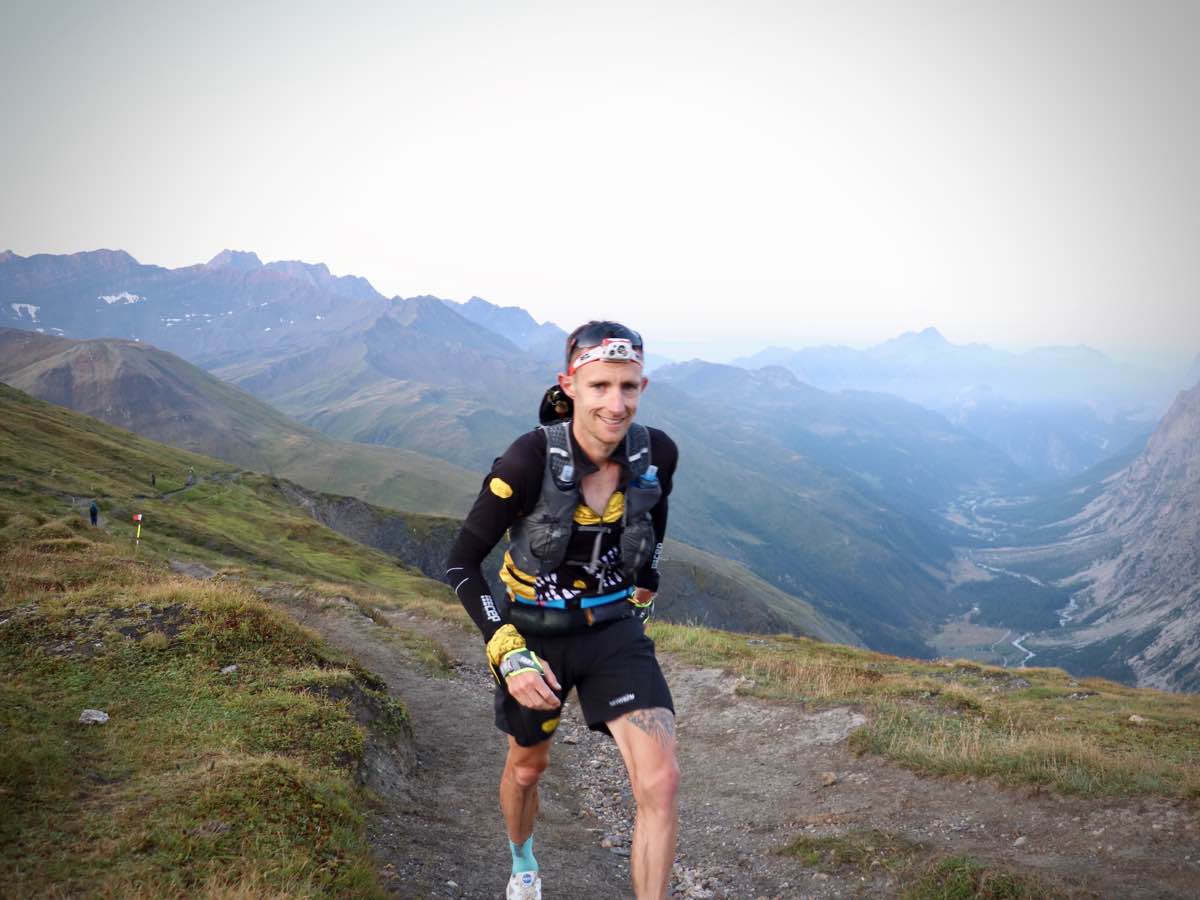
Scott Hawker cresting Grand Col Ferret at sunrise. Photo: Trail Running Argentina/iRunFar/Mauri Pagliacci
Fast forward a few more kilometers to the Grand Col Ferret at 101km into the race and the border between Italy and Switzerland. It’s probably downplaying his performance to say that Capell charged the big climb, and then he kept on charging to Champex-Lac at 126km. In both places we saw him panting with the effort and moving so fast, possessing not an inkling of hesitation. But so was Thévenard, who has historically put moves on his competition in this section of the course. Thévenard moved well, gaining plenty of time on the men behind him but still losing minutes to the lead. Entering into the race’s final third, it was looking like Capell was the better runner. Up on the col we met a Hajnal who wasn’t as fresh but was still moving in third. And in a move of complete badassery, Hawker seemed to have left his earlier rough patch behind, and was now fourth and looking great.
At Trient, 143km into UTMB, Thévenard had clearly pushed but couldn’t make headway on the big gap to the lead and was looking a bit worn. In fact, it seems like these efforts instead led to a rough patch he’d stay in until the race was almost over. Hawker jumped on the podium spot, but he also had Owens following close. New names in the top 10 in the race’s final third included Joaquin Lopez from Ecuador and the Basque battler Javier Dominguez. Hajnal finally withdrew from the race at this point, and the race also lost Nichols and both Millers in various places around the second half of the course. Qi finished, however far back in the field.
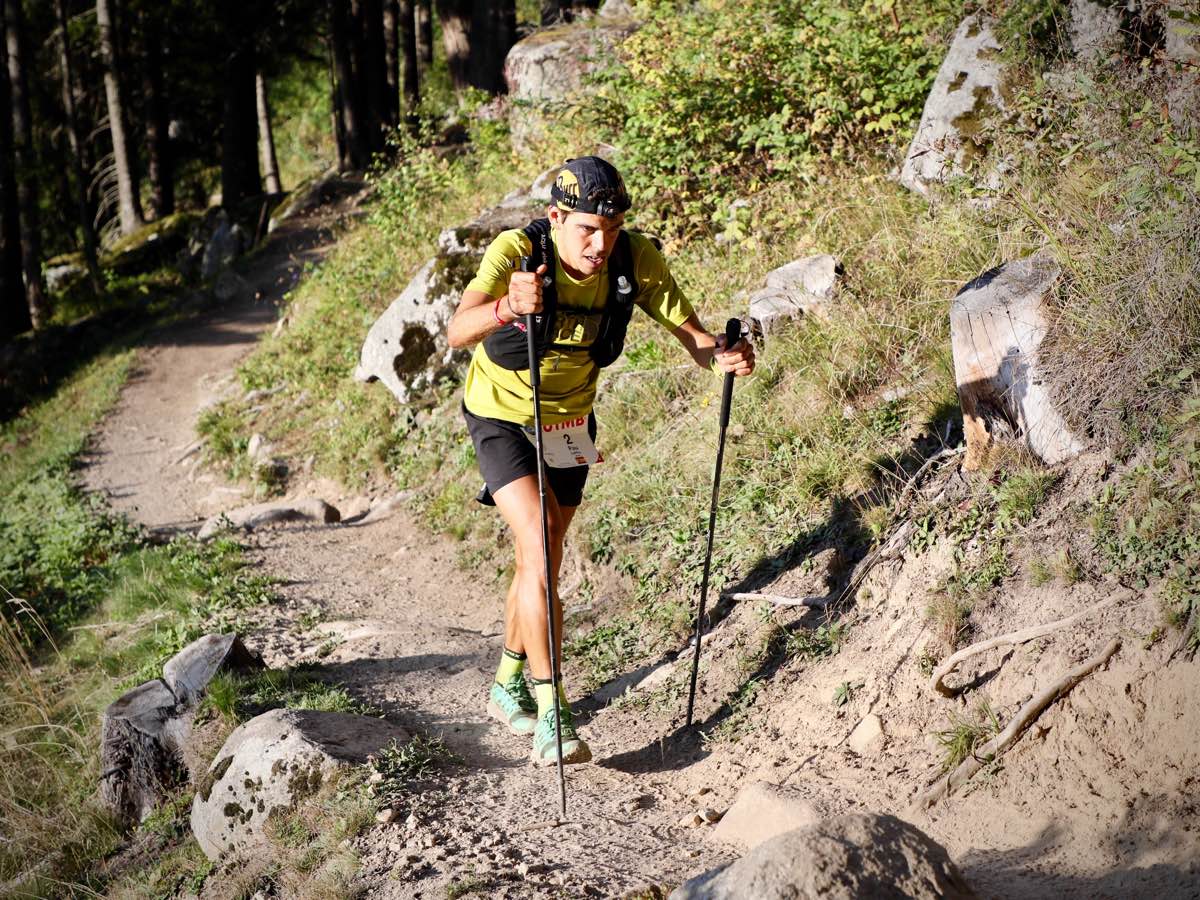
Pau Capell at Champex-Lac. He was untouchable by everyone at the 2019 UTMB. Photo: iRunFar/Meghan Hicks
Capell finally achieved his ultimate goal of the season, winning the 2019 UTMB. Thévenard was second, after chasing all day. He’d posted his desired splits on social media beforehand, which he said post-race were based on his 2015 race, and finished within four minutes of them! Hawker had his breakout race finishing in third. The work done by the British lads also got its good pay: Owens finished fourth and Symonds in fifth. Lopez and Ho-Chung Wong from Hong Kong tied for sixth, Japan’s Masatoshi Obara finished eighth, and France’s Germain Grangier tied for ninth with Dominguez. What a year at UTMB!
2019 UTMB Men’s Results
- 1. Pau Capell (The North Face) – 20:19:07 (pre-race and post-race interviews)
- 2. Xavier Thévenard (Asics) – 21:07:56 (pre-race and post-race interviews)
- 3. Scotty Hawker (Vibram) – 21:48:04 (post-race interview)
- 4. Tom Owens (Salomon) – 22:04:29 (post-race interview)
- 5. Andy Symonds (Scott) – 22:35:15
- T-6. Joaquin Lopez (Movistar) – 22:47:47
- T-6. Ho-Chung Wong (Champion System) – 22:47:47
- 8. Masatoshi Obara – 23:00:12
- T-9. Javi Dominguez (Vibram) – 23:16:03
- T-9. Germain Grangier (On Running) – 23:16:03
- 11. Can-Hua Luo – 23:21:17
- 12. Martin Kern – 23:38:44
- 13. Guillaume Beauxis – 23:41:28
- 14. Lluis Ruiz – 23:59:49
- 15. Harry Jones (Hoka One One) – 24:03:53
- 16. Moises Jimenez (The North Face) – 24:10:39
- 17. Matthias Krah (Compressport) – 24:20:45
- 18. Sylvain Court – 24:26:28
- 19. Jason Schlarb (Altra) – 24:27:59
- 20. Francisco Freitas – 24:29:19
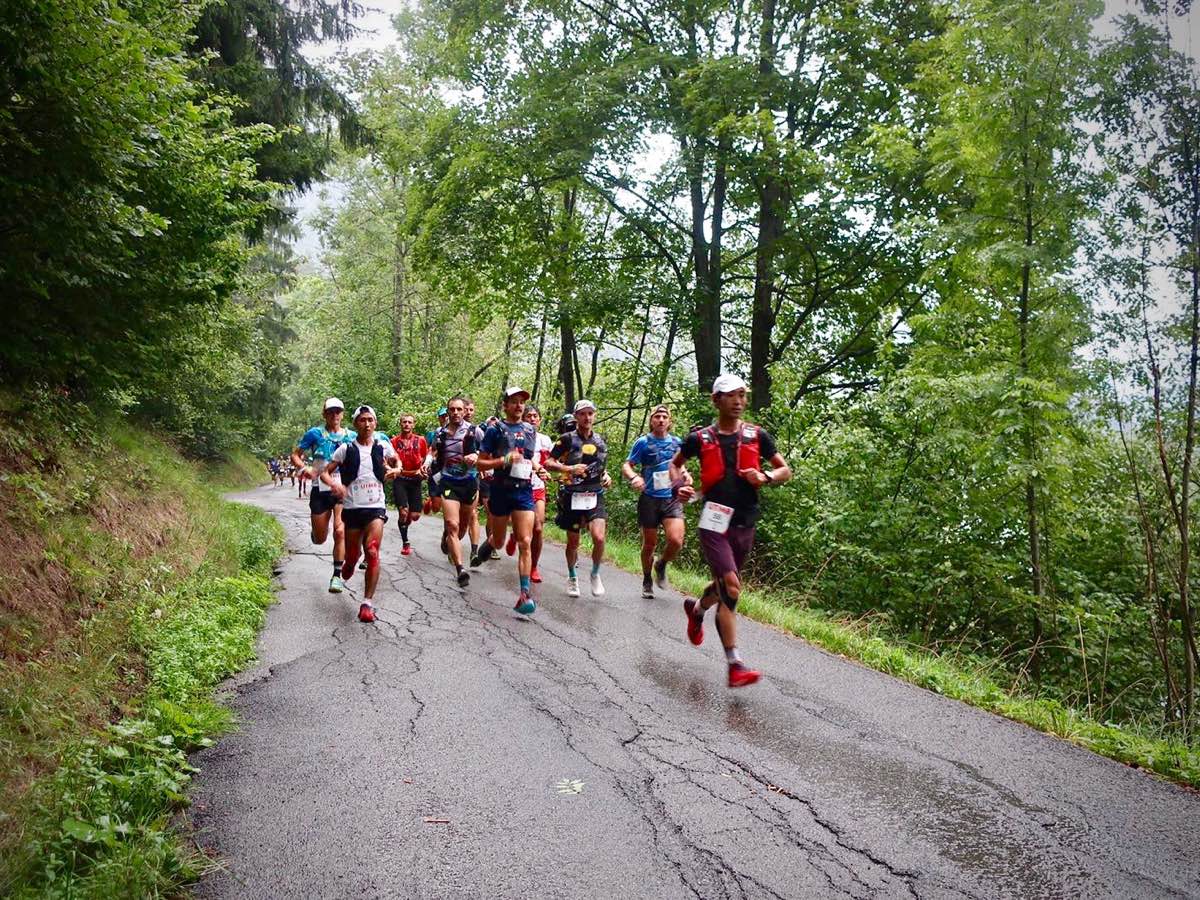
The 2019 UTMB men’s race going out hot at Les Houches, just 7 kilometers in. Pau Capell was already well off the front of this group. Photo: iRunFar/Marissa Harris
Coverage Thanks
Thank you to Mauri Pagliacci, Marissa Harris, Olivia Rissland, Adam Gerard, Kirsten Kortebein, Fabrice Van de Cauter, Tom Van de Cauter, Makiko Yamashita, Simon Mawby, Antonio Grassi, Pierre Berteloot, Anca Berlo, Nelson Coomans, Andy Kumeda, and Jill Liston for their help in the field all around Mont Blanc. Thank you also to Ellie Greenwood and Casey Szesze for their office help, as well! It is because of this extraordinary team that we were able cover UTMB all over the mountain and in three countries!
